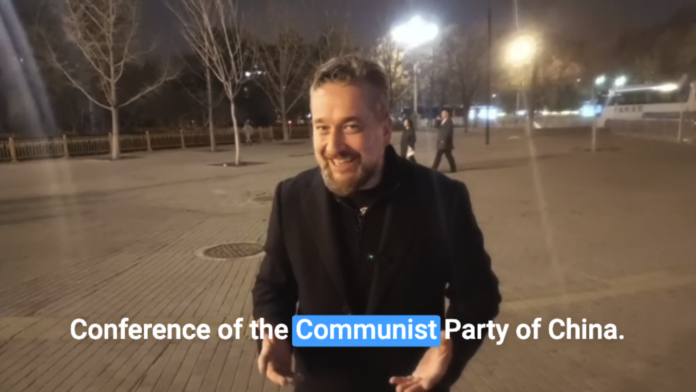Mr. Blaha’s remarks, while notably radical and nationalist in European Parliament settings, take on an even more extreme tone when addressing domestic audiences—revealing the true depth of his pro-Kremlin, pro-China rhetoric and providing an alarming insight into how high-ranking figures in Robert Fico’s SMER party communicate domestically, which, in turn, offers another perspective on how to interpret Mr. Fico and his political vison.
Championing China’s Communist Regime
Blaha wasted no time proclaiming his admiration for China’s Communist Party during his visit to an international conference in Beijing. “I am a big fan of the Chinese Communist Party,” he declared, adding that China’s socialist governance has made it an unbeatable global force. Praising the CCP’s ability to lift 800 million people out of poverty, he described their economic and technological progress as “proof that the so-called ‘evil communists’ are outperforming the West in every aspect.”
Further, Blaha extended congratulations to the CCP for surpassing Western powers in key areas, including technology. “In innovation, China is 100 years ahead of Europe,” he asserted, claiming Western nations are hopelessly lagging behind despite their attempts to maintain global dominance.
Mocking Western Democracy
In an attack on Western liberal democracies, Blaha accused the EU and its allies of arrogance and imperialism. “We keep lecturing the world about human rights like the last imperialists,” he mocked. He also ridiculed Western countries for what he described as their fixation on moral superiority, claiming, “The West should stop acting like it’s the centre of the universe. Nobody cares.”
This rhetoric reflects the influence of authoritarian propaganda aimed at eroding faith in democratic institutions. His assertion that liberal democracies are “chaos, inequality, and war” starkly contrasts with his rosy portrayal of China’s one-party rule.
Promoting a Return to Socialism
Blaha’s commentary reveals a nostalgic yearning for state-led socialism, dismissing Slovakia’s post-1989 transition to democracy. He lamented, “We threw away all the achievements of socialism after 1989 and turned into neoliberal colonies of Western corporations.”
He went on to highlight his belief in state planning and regulation as key to success, claiming, “China’s success is built on state ownership and regulation, while our slavish devotion to the free market has left us in ruins.”
Advocating Eastern Alliances
Blaha’s rhetoric is not limited to praise for China but also advocates closer ties with Russia, framing it as part of a balanced foreign policy. “Slovakia needs good relations not only with the West but also with the East, including Russia and China,” he said, dismissing concerns over the Kremlin’s aggressive strategies in Europe.
This approach directly contradicts Slovakia’s obligations as an EU and NATO member, creating friction with its Western allies and feeding disinformation narratives that aim to fracture democratic cohesion.
Weaponising Cultural Diplomacy
Blaha’s visit also included calls for Slovak-China cultural cooperation, citing his personal connection to Chinese martial arts. “My son loves kung fu and has won several gold medals. When I told this to Chinese comrades, they were thrilled,” he recounted, urging Slovakia to foster more cultural ties with Beijing.
This seemingly innocuous anecdote masks the broader issue of how such engagements can be exploited by authoritarian regimes to project soft power and influence over democratic states.
A Threat to Slovakia’s DemocracyBlaha’s alignment with authoritarian ideals reflects a broader challenge to Slovakia’s democratic principles and foreign policy commitments. By glorifying regimes that employ grey-zone tactics, he not only undermines Slovakia’s alliances but also erodes trust in the very foundations of its democratic governance.
Author: Victor Breiner | Slovak Media Monitor








